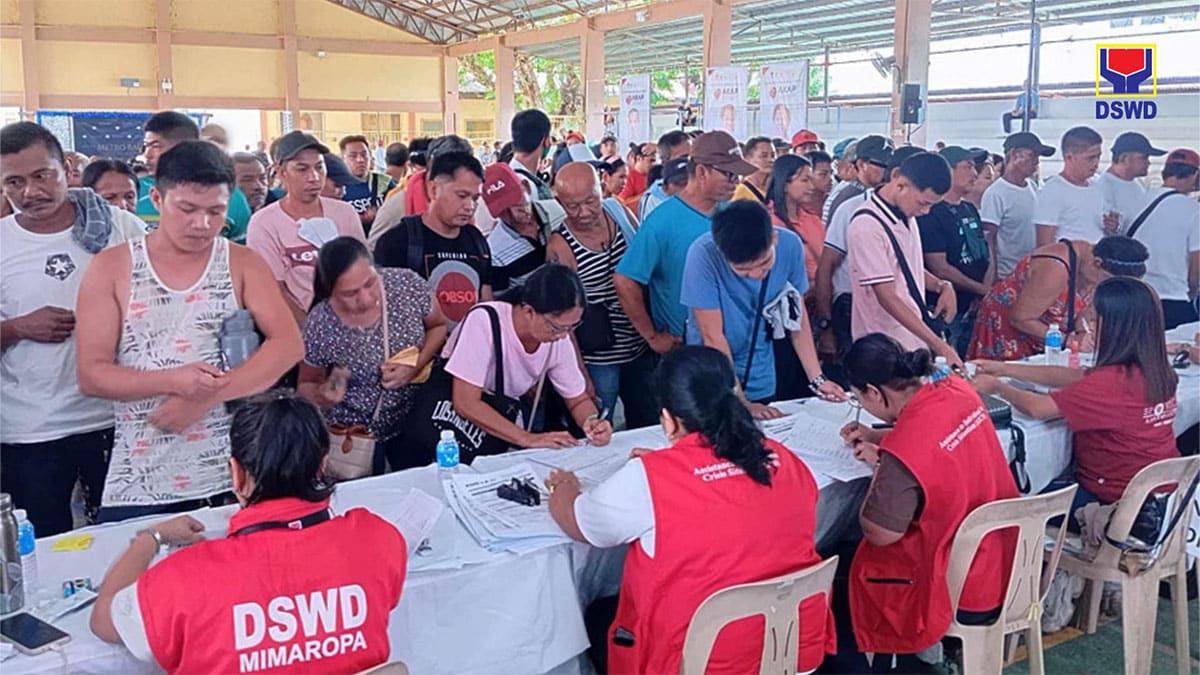
NEAR POOR The Ayuda para sa Kapos ang Kita Program (Akap) was launched nationwide by the Department of Social Welfare and Development (DSWD) on May 18, with an initial funding of P3 billion. Photo taken that day and released by the DSWD’s Mimaropa field office shows the first wave of applicants who came for the cash assistance ranging from P3,000 to P5,000 per beneficiary.
MANILA, Philippines — Social Welfare Secretary Rex Gatchalian has assured the public that politicians would not have a hand in implementing the P26-billion aid program of the Department of Social Welfare and Development (DSWD) that was included in the 2025 national budget.
According to the social welfare chief, potential beneficiaries of the Ayuda para sa Kapos ang Kita Program (Akap) do not need to obtain a behest request from any government official to avail of any assistance under the aid facility as the DSWD would be its “sole implementer.”
“The whole P26 billion will be implemented by DSWD, not politicians, not our public servants. That is DSWD’s funds. All of that—every cent—will go through scrutiny by our social workers,” he said in a radio interview on Friday.
READ: Talk to our people, House tells Senate on Akap program
Gatchalian made the clarification after the P26-billion funding for Akap was restored in the proposed 2025 General Appropriations Act (GAA) by the bicameral conference committee on Dec. 11, despite differing views about the aid program between lawmakers in the Senate and the House of Representatives during the early stages of the budget deliberations.
Not for poorest
Akap is a social assistance program for those “not belonging to the poorest of population,” but are severely affected by inflation, or the rising cost of goods and services. The income of the beneficiaries should not exceed the prevailing minimum wage set in the places where they live.
According to DSWD, a one-time cash assistance amounting to between P3,000 and P5,000 is provided to eligible beneficiaries.
Sen. Imee Marcos had proposed to remove Akap from the DSWD budget for next year.
For her, programs with more “long-term” benefits, such as the Sustainable Livelihood Program and the Kapit-Bisig Laban sa Kahirapan-Comprehensive and Integrated Delivery of Social Services, both under the agency, should be prioritized.
P3-B initial fund
President Marcos and Speaker Martin Romualdez launched Akap on May 18 this year with an initial P3 billion for distribution to more than 1 million beneficiaries.
Gatchalian said then that the program aimed to provide immediate financial relief to the poor, “near-poor,” minimum wage earners, low-income earners and those in financial distress.
According to the guidelines spelled out in DSWD’s Memorandum Circular No. 4 approved in March, Akap aid can be provided directly by DSWD through its crisis intervention units and social welfare and development satellite offices or with help from local government units (LGUs).
“However, the financial assistance that will be provided to qualified beneficiaries through the LGUs shall be called rice assistance because it shall be used for purchasing rice to meet the nutritional requirements for sustenance,” the memo said.
Fund transfer, liquidation
The DSWD would have to enter into a memorandum of agreement with the LGU to “spell out the details of the transfer of the funds and the requirements for its liquidation,” in line with existing auditing and accounting rules.
But if Akap aid comes directly from DSWD, beneficiaries are entitled to any of the four kinds of social assistance, namely food, medical, funeral and cash relief, depending on their needs and the requirements they submit to the agency for eligibility.
The Inquirer reached out to DSWD officials to ask whether the guidelines would be revised to ensure that the aid would reach only the intended beneficiaries and to close any room for corruption, but they gave no immediate response.
Different from 4Ps
DSWD reported that some 4 million had received various forms of assistance this year under Akap, equivalent to a utilization of P20.7 billion, or 77.6 percent of the total budget. In Metro Manila alone, some 589,000 people benefited from Akap.
In his radio interview, Gatchalian said Akap was different from the Pantawid Pamilyang Pilipino Program (4Ps) in terms of beneficiaries and objectives. The 4Ps is the government flagship antipoverty program.
He said Akap aid would be provided when there’s a current need, unlike the 4Ps, which is received monthly by beneficiaries who have to be assisted in rising from poverty because they have no income at all and are considered the “poorest of the poor.” The 4Ps recipients also need to fulfill certain conditions.
Akap beneficiaries receive a one-time cash assistance, if they are eligible and their income falls under the poverty line.
Requirements
Under the DSWD guidelines, applicants for Akap aid must present any government-issued ID and a document proving that he or she earns minimum wage or below, such as a certificate or contract of employment or an income tax return.
For medical assistance, they must submit a medical certificate or abstract, discharge summary, certificate of confinement, laboratory request or treatment protocols, whichever is applicable.
For funeral assistance, applicable documents like a death certificate or funeral contract will have to be presented.
DSWD social workers will scrutinize their submissions before approving their applications. —with a report from PNA

